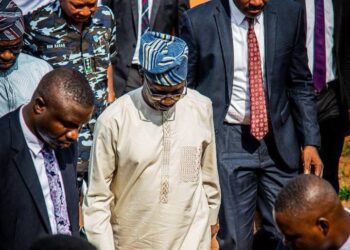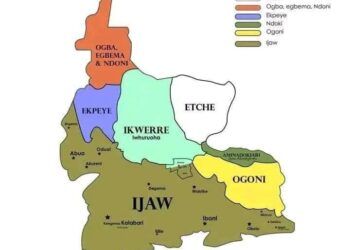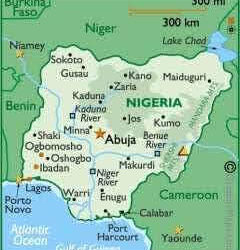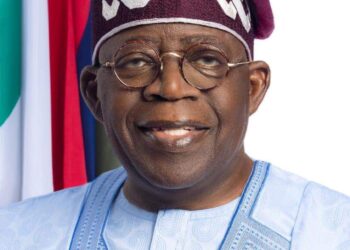By Idowu Ephraim Faleye
When I wrote “The Battle to Break Tinubu Is a Battle to Break Nigeria,” I had no idea it would spark a national and global reaction. I had no strategy, no publicity team, no newspaper backing. I simply wrote what I felt in my spirit is a burden too heavy to ignore. I poured my convictions into words, and I shared them in the most ordinary way on a WhatsApp post.
Then the phone started ringing. And it didn’t stop. Over 600 calls, messages, and voice notes flooded my line. They came from strangers, friends, journalists, professors, religious leaders, students, civil servants, market women, diaspora Nigerians, and even from political actors across the divide. The overwhelming majority of more than 95 percent called with support, encouragement, and a deep sense of shared emotion. A few, less than 5 percent, expressed anger, disagreement, or warning. But all of it—every single reaction—was proof that the article had touched a live wire in Nigeria’s collective consciousness.
Some called from the UK and said, “You gave us words for what we’ve been feeling but couldn’t articulate.”
Others from the U.S. said, “Please don’t stop. Nigeria needs more voices like yours.”
People from the North and South alike said, “Finally, someone has put it all together—what we feared, what we hoped, and what we needed to hear.”
Bloggers picked it up. Newspapers published it. Radio shows referenced it. Some even translated it into local languages. One TikTok user turned it into a passionate spoken-word performance. WhatsApp groups began adding me without invitation. In less than 72 hours, I had become unintentionally—a public voice in a national debate.
But beyond the noise, what struck me most was the raw sincerity in people’s reactions. A teacher from Zamfara called with a shaky voice and said, “This is not about tribe. It’s about truth. And truth is rare in this country.”
A retired soldier from Gombe told me, “We fought for a united Nigeria. We didn’t fight so that a few can keep holding us back.”
A woman from Delta State texted, “I cried while reading it. Not because of Tinubu, but because of what Nigeria could become if we let this cycle continue.”
An elderly man from Kano said, “Though I may not fully agree with everything, I respect your courage. This is what patriotism looks like.”
Some reactions were sobering. A young man in Abuja warned, “They won’t like this. Be careful.”
Another asked, “How did you know so much? You must be working with someone.”
These comments reminded me that in Nigeria, truth is often dangerous, and speaking it carries risks.
Yet I am not afraid. Because if 600 Nigerians, without advertisement, without coercion could reach out just because of a WhatsApp article, then something bigger than me is moving. It is the voice of a people tired of lies, manipulation, and a recycled system that benefits only a few.
What many of these callers made clear is this: the struggle in Nigeria today is not about one man. It’s not just about Tinubu. It’s about the soul of our country. It’s about whether we can break the curse of political puppetry and finally allow leadership to be driven by merit, not manipulation.
They told me that the pain Nigerians are feeling from subsidy removal and naira instability is real—but that the pain of returning to a captured system would be worse. They said they want reforms to work, even if they’re difficult, because they believe we’ve reached a point where change must either be painful now or impossible forever.
And to my surprise, many critics of Tinubu called not to argue, but to reflect. One said, “I still don’t like his politics, but this article made me think differently.”
Another admitted, “I’ve been part of the protests, but I see now that not every complaint is pure. Some are sponsored.”
This, to me, was powerful. It showed that Nigerians are not blind. They are watching, thinking, evaluating—and more awake than ever.
But what shook me the most was what people saw behind the words. Many said, “This is the first time I’ve read a political article that sounded like it came from my own heart.”
That’s when I realized: this was not about me. The article had simply echoed what millions have been thinking, silently, painfully, powerlessly.
Now the silence is broken. So what comes next? First, let me say this: I am not on any government payroll. I have no personal stake in defending Tinubu—or attacking him. I speak as a Nigerian. As someone who believes that we have come too far to keep playing the same ethnic and regional game that has destroyed generations of potential.
I have received invitations to write more, to speak, to appear on panels. I will honor some of these—not for fame, but because this conversation must continue. Nigeria is at a fork in the road. We can either fall back into the comfort of corruption and control by hidden hands, or we can walk through the hard road of national rebirth.
This moment is not about me. It is about you. It is about the people who called me crying. The ones who wrote in Hausa, Igbo, Yoruba, and pidgin. The students who said, “Sir, we printed your article and read it aloud in class.”
The diaspora Nigerians who said, “We are sharing this on our platforms because we don’t want to give up on Nigeria.”
To all of you, I say thank you. You made me believe that Nigeria is not dead. That conscience still exists. That truth still matters. To those who attacked me, I say thank you too. You reminded me that truth divides before it heals. To those who read but stayed silent, I understand. In this country, silence is often survival. But one day, even silence must speak.
So here we are: 600 calls later. Hundreds of messages. Thousands of shares. One voice became many. And now, I challenge you—yes, you reading this—to take the baton. Speak your truth. Write what burns in your heart. Say what others are afraid to say. Not for clicks or claps, but because Nigeria needs all of us.
The time of fear is over. We must now speak. Loudly. Clearly. Boldly. Because if one article on WhatsApp can wake this many people up, imagine what a chorus of voices can do. Let’s not wait for another political disaster. Let’s not wait for the system to silence us again.
The people are awake. Let the leaders be warned. Let the betrayers be exposed. Let the truth rise. And let history record that in the face of manipulation and fear, Nigerians chose to speak—and to be heard.
Idowu Ephraim Faleye writes from Ado-Ekiti +2348132100608















Discussion about this post